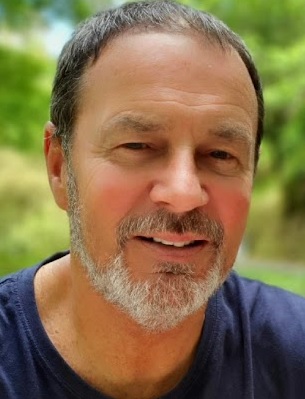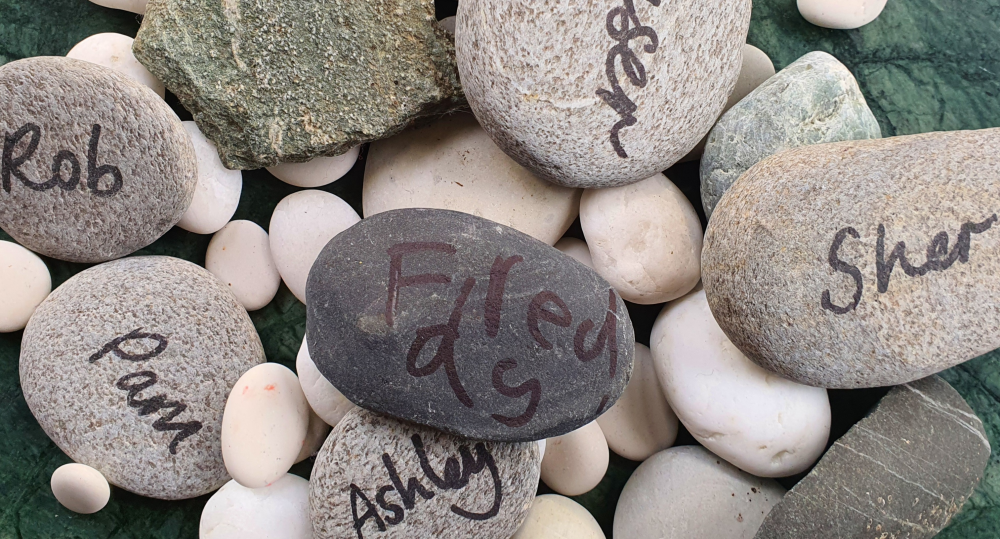
On a small antique table in the hallway of our family home sits a large clear jar containing smooth oval grey and white pebbles.
On each stone is handwritten the name of a family member. Originally the stones were place settings at our daughter’s wedding some years ago. After the event she gathered them up as a gift and they’ve sat in the hallway ever since, like a memento of a happy occasion.
As time goes by the jar and its contents tend to go unnoticed and blend into the familiar décor, next to some framed photos and a tablelamp.
However over summer our 6-year-old grandson named Freddy visited nanna and poppa’s house. Spotting the jar he asked about all these stones and names?
So it was explained that the jar represented our family and that the stones were its members.
Naturally enough he took each stone out to check the names, seeing that he could see mum and dad’s name and one for a family member who had since passed away but, more notably, that there was no stone with his name on it, or any of his younger cousins. They, of course, weren’t with us at the time of the wedding so in Freddy’s mind the absent names seemed an oversight.
There was nothing for it but to immediately find a blank stone and for Freddy to carefully write his name on it and place it in the jar with all the others.
One can imagine that Freddy felt he needed to correct something in the act of adding his name to the jar, which must also have given him a great sense of belonging. At 6 years-old he is likely asking himself questions like “who am I and where do I fit into this thing called family?”
He shares a home with his immediate family in Auckland – mum and dad, plus two younger siblings and a dog – which is a familiar and secure setting. But the extended family is much larger and seen less often, so was observing that he is a member of something bigger, wider and very important.
It might have been what author Gail Lumet Buckley had in mind when she said “Family faces are magic mirrors. Looking at people who belong to us, we see the past, present, and future.”
That ‘belonging’ is also probably why a family dislocation or rift is most difficult to handle. We tend to have so much emotionally invested in our families that it carries with it inevitable vulnerabilities that cause considerable angst when trouble visits.
Whether we actively acknowledge it or not our ancestry and family connections are bedrocks for each of us individually and is the foundations of a functioning society. Māori understand and celebrate it as whakapapa (based on genealogy) and view individuals as simply part of whanau (family), hapu (extended family), through to a wider connected community. While location and place may be important, it doesn’t matter where you are in the world, you are in a whanau with all its obligations and benefits, no matter what.
The stones in the jar also got me thinking about the age-old argument about the ascendancy of the individual over that of the group or wider community.
For a 6-year-old, untroubled by such adult questions, it seemed clear. He, as an individual, wished to assert himself and his name, but as part of the family. It gives him a sense of identity and belonging that he can’t quite get from any other group, for example his school friends or his mates in ripper rugby. He could see that there are blood relationships between him and his parents, but also uncles, aunts, cousins and grandparents, all of whom look out for him, no matter what. And, to boot, there are physical traits and characteristics that seem similar.
It reminds us that a raft of social research supports the idea that people who are connected and look after each other are happier than those who are isolated and self-absorbed. Altruism, with its roots in empathy and social support, plays a critical role in enhancing wellbeing. By fostering a culture of kindness and compassion, both individuals and societies can reap the benefits of increased happiness and a stronger sense of community.
The path to a happier life, it seems, is paved with acts of generosity and care for one another, starting with families.
 You can contact Fraser here.
You can contact Fraser here.
Fraser Carson is the founding partner of Wellington-based Flightdec.com. Flightdec’s kaupapa is to challenge the status quo of the internet to give access to more reliable and valuable citizen generated content, and to improve connectivity and collaboration.
Flightdec websites include: KnowThis.nz, Issues.co.nz and Inhub.org.nz.
OTHER POSTS



